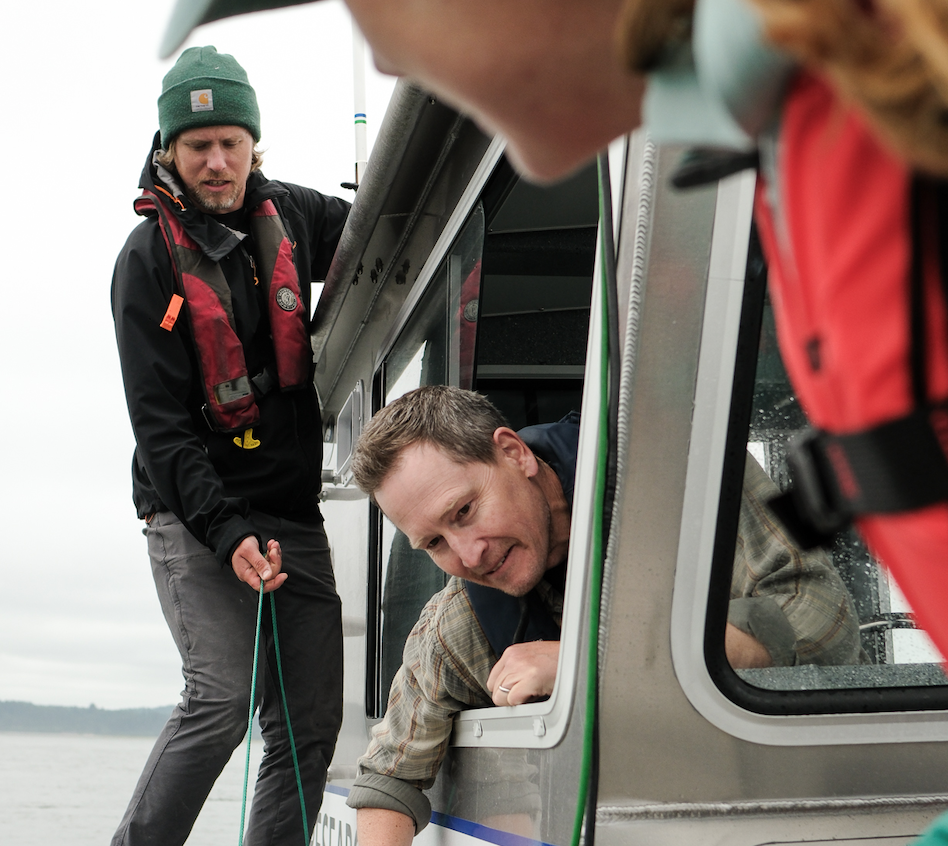Coast Chronicles: Merry-Ann and Liam Keane arrive
Published 8:12 am Monday, October 21, 2024

- Our new Ocean Beach Hospital CEO Merry-Ann Keane and her husband Liam were honored last week at a meet-and-greet at the Peninsula Performing Arts Center.
Power couple
One grey evening last week, the gloom was brightened by a gathering of local king/queen pins at the Peninsula Performing Arts Center and a new power couple in town. Sue and Bill Svendsen offered their space, Rita Nicely cooked up a complementary storm of deliciousness, and George Coleman strummed tunes for the crowd of twenty or so folks. The event? — the official welcoming of Merry-Ann and Liam Keane, our new superintendent and chief executive officer of Ocean Beach Hospital and her husband.
Hospital board of commissioners and foundation members arrived in ones and twos and were introduced to Merry-Ann hovering by the front door: among others present were Nancy Gorshe, Nancy and Phil Allen, Sally and Jerry Macy, Ariel Smith, Dave Tobin, Theron Dixon, Mark Newsom, Sue Yirku, Jenna Austin Nesbitt, Madeline Matson, Cora and Anthony Barran, Dennis and Kathy Long, Mary Kanc, Sondra Nash-Eaton, Elise Chayet, Sandy Stonebreaker, Melissa Ramsey, Nanci Main, and Teri Kovach. Folks greeted the Keanes and went on to talk about whatever topics were in the air. (The election, the hospital, the weather, and the food: salmon and pork roll-ups, lox, prawns, chicken piccata meatballs, little yummies on skewers, and Jerry’s baklava.) Mostly ringing in the air was, “Welcome, welcome, welcome. We’re so glad you’re here!”
I had the distinct pleasure of speaking briefly with Liam, since Merry-Ann, in classic black with hair high on her head, was the belle of the ball and had quite a reception line in front of her. Nearly the first thing Liam said was, “It’s so beautiful here. And I’ve been all over the world!” Then, like the supportive partner he must certainly be, he praised Merry-Ann. “She loves her work so much — she is all about quality care. Merry-Ann knows it’s never about you, it’s about what you can give.” When I asked about where they intended to settle down he said, “We just bought a place across from the golf course — we’re part of the community. I can’t invite you over yet because we have boxes everywhere.” I didn’t stay long but I did get a promise from Merry-Ann to talk the next morning.
Parable of the curtains
Brandon Cline’s front page Oct. 14 story about Merry-Ann’s covers a lot about her training and background, but I wanted to fill in some information around the edges. I wanted to hear about her leadership style, so I asked, “How do you make positive change where you are?”
“First let me say I’m really glad to be here. I developed my leadership style long before it actually became fashionable — I truly believe in ‘servant leadership.’ I want to understand where there are pebbles in peoples’ shoes. And then to remove them or to soften them to allow peoples’ work lives to be better.”
“In my very first leadership position — I fell into management as most nurse leaders do. It happens when all of your peers say ‘Can you please do something about this because no one else is?’ — I was in a relatively small hospital of 80 beds. I was given the OB clinic and also the surgical department. I hadn’t done any surgery since nursing school, except cesareans, but I went in with the attitude of ‘What would make your work life better?’ I could have come in with all my theories and ideas but what if they didn’t make sense to my staff? Instead I listened. And guess what I did?” [I had no idea.] The best thing I did for that department was curtains for the staff room. We spent $200 for the staff room and my staff felt cared for. We got rid of those old ratty curtains!”
As someone who, in another life, was a strategic planning consultant for organizations, I completely understand this viewpoint. Sometime the flex points for change are not what you think they’d be; sometimes simply humanizing an environment is a powerful catalyst. (Might I also add this is a particularly and much needed feminine perspective?)
Listening tour
So it’s no surprise that Merry-Ann is beginning with a listening tour. As she says, “Right now I’m in this 90-day window and I’m doing an assessment of what the staff needs and of what the patients are going to need. As part of that I’m doing rounds with my team, and one-on-one conversations with all the providers and managers. I want to understand their perspectives.”
“I have this luxury — and I know it’s a luxury — of having these 90 days to do a thorough needs assessment. And keeping Larry Cohen, interim CEO, as a project manager means he can spend his time dedicated to making some magic happen. We’ve got the support of the community in the recently approved bond issue and we’ll collaborate on how to make needed improvements.”
Why Ocean Beach Hospital?
Merry-Ann continues, “I grew up in a small town in northern Edmonton in Canada in a very challenging environment, in a single parent family — we had to work, we had to work for what we had. And when you grow up in that way you never forget to always have softness and kindness for everyone — that’s reflected in my nursing: every single human is important.”
“My grandfather was the dean of a forest technology school in the mountains, and I spent a lot of my off-time in these small rural areas where it’s the people, it’s the community. So I know how you have to work in a small rural and remote community. You don’t understand that until you’ve lived it. I always equate it to being on a spider web, when you touch one thread the whole web reverberates. You need to understand the culture, the community, the context of where you live.”
Merry-Ann is also the incoming chair of the rural hospital OB subcommittee for the Washington State Washington State Hospital Association. As she says, “I’m too new to have a complete picture of what I’d like to see. I don’t know enough yet. And I can tell you that I’m in a privileged position — I understand that. But I know one thing, when you’ve seen one critical access hospital you’ve seen one critical access hospital.” Meaning every facility and every community is different.
I ask her to define critical access hospital. “A critical access hospital is one with 25 beds or fewer that is 35 miles from another hospital.” That’s us. With this in mind, Merry-Ann is thinking about what’s needed in our rural environment for a different approach to staffing. “I think we should be thinking about creating training for a different kind of work force. We’ve got ahead of us a huge ‘silver retirement’ of boomers. This is still in formation, but I think we need a training track for rural nurses. They’ll have to be jacks and masters of all trades. Many of my nurses float between acute care and ER. We’ll need specially trained nurses who have the ability to flip into different departments, they can’t be just OB nurses because the hospital will need them for many other the types of care. And we haven’t yet built a program or state of mind for that kind of staffing.”
One of the challenges for all types of commercial ventures on the Peninsula has always been attracting top quality candidates — whether it’s for high-end restaurants or professional facilities like the hospital or the behavioral health clinic. Often other family members can’t find housing or appropriate jobs, or they think the cultural offerings here are too sparse; so the best candidates often go elsewhere.
This is not the case for the Keanes. “Liam and I will be fitting into the community as citizens. We truly are local citizens and our family is where we are. For Liam, the Peninsula reminds him of home. For him it’s just a lovely feeling to be back in a seaside community and we’re excited about exploring.” The Keanes have two adult children, one in Canada and one in Oregon, so Merry-Ann says, “The Peninsula is a midpoint. It’s perfect for us!” We think so, too.









